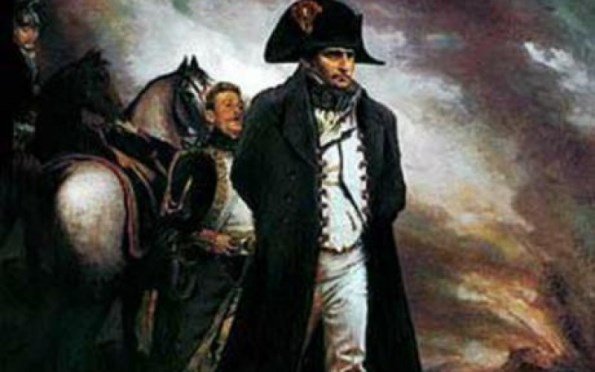Why Was Napoleon Bonaparte Defeated At Waterloo?
AncientPages.com - Napoleon Bonaparte (1769-1821) was undoubtedly one of the greatest military leaders of all time. He led several successful campaigns during the French Revolutionary and during his reign as an emperor he conquered most of Europe with an array of insightful tactics.
Being a military genius, Bonaparte was responsible for turning France into a superpower.
The Emperor Napoleon at Waterloo.
However, there were times when even the great Bonaparte was defeated. He sometimes had a tendency to underestimate his enemy. He was overconfident and this attitude led that he was occasionally defeated. For example, Napoleon’s invasion of Russia was a fiasco because he underestimated the cunning strategy of Tsar Alexander I. Napoleon also did not consider the cold Russian winters.
Bonaparte’s failure in Russia was the beginning of his downfall and the rise of Russia’s status as a leading power in post-Napoleonic Europe.
Battle At Waterloo
Napoleon’s Battle at Waterloo, Belgium is a famous military encounter, but it’s also a battle that went completely against him and his forces. The battle was between, France on side and Great Britain, Prussia and their allies on the other. The battle was a great victory for the British and the Prussians and it is widely seen as the end of the series of wars that had ravaged Europe since the French Revolution (1789).
See also:
Napoleon Bonaparte Dies In Exile On The Island Of Saint Helena – On May 5, 1821
Island Of St. Helena – Last Residence Of Napoleon Discovered – On May 21, 1502
Napoleon Bonaparte Dies In Exile On The Island Of Saint Helena – On May 5, 1821
The Battle at Waterloo was fought on June 18, 1815. It was the first and last encounter between two great military leaders – Napoleon Bonaparte and Duke of Wellington. The main reason why Bonaparte lost the battle against the Englishmen was because he had insufficient knowledge about his enemy.
Napoleon Bonaparte entered the Battle of Waterloo confident that his army would fully defeat Duke of Wellington.
The French Emperor had not received information about Wellington’s new, clever military strategy. Bonaparte completely underestimated Duke of Wellington and the allied forces.
Bonaparte Underestimated Duke of Wellington And the Allied Forces
Duke of Wellington had a cunning plan. He established a strong defensive position on a ridge and had fortified some farmhouses in the area, to protect his flanks.
Bonaparte followed an old-fashioned strategy and he was unprepared for Wellington’s deadly surprise.
On the afternoon, Bonaparte ordered his forces to attack the British and their allies before the Prussians arrived. He decided to attack the British the day after arriving at Waterloo.
When the French forces carried out the attack, they were taken by surprise by British soldiers who had been hiding behind a hill. The Battle at Waterloo turned into a bloodbath. More and more allied forces joined the battle and there was no way Bonaparte could win.
Waterloo cost the British army around 14,500 dead or wounded and the Prussians under Blücher suffered some 7,200 casualties. The French army had some 25,000 to 26,000 killed or wounded. Some 6000 to 7000 French soldiers were taken prisoner and another 15,000 men deserted. Waterloo was a decisive victory for the allies.
Napoleon’s army was no longer an organized fighting force and the British and Prussians were about to invade France, which was practically defenseless.
Waterloo ended the career of Napoleon one of the greatest generals in history. It also ended the last serious attempt by France to dominate Europe.
AncientPages
More From Ancient Pages
-
 Rare Well-Preserved Viking Artifacts Lost On Mountain Pass – Revealed By Retreating Glaciers
Archaeology | Apr 16, 2020
Rare Well-Preserved Viking Artifacts Lost On Mountain Pass – Revealed By Retreating Glaciers
Archaeology | Apr 16, 2020 -
 On This Day In History: Planet Neptune Officially Discovered – On Sep 23, 1846
News | Sep 23, 2016
On This Day In History: Planet Neptune Officially Discovered – On Sep 23, 1846
News | Sep 23, 2016 -
 Troublesome Momus: Deity Of Irony, Ridicule, Sarcasm And Harmful Jokes In Greek And Roman Mythology
Featured Stories | Mar 14, 2022
Troublesome Momus: Deity Of Irony, Ridicule, Sarcasm And Harmful Jokes In Greek And Roman Mythology
Featured Stories | Mar 14, 2022 -
 A New William Shakespeare First Folio discovered on Isle of Bute, Scotland
Archaeology | Apr 10, 2016
A New William Shakespeare First Folio discovered on Isle of Bute, Scotland
Archaeology | Apr 10, 2016 -
 10 Aztec Symbols Explained
Ancient Symbols | Mar 20, 2018
10 Aztec Symbols Explained
Ancient Symbols | Mar 20, 2018 -
 Legend Of The Blue Men Of Minch: Were They Mythological Creatures Or Real Men?
Featured Stories | May 13, 2016
Legend Of The Blue Men Of Minch: Were They Mythological Creatures Or Real Men?
Featured Stories | May 13, 2016 -
 Why Did Winter Baths Become So Popular?
Ancient History Facts | Jan 16, 2024
Why Did Winter Baths Become So Popular?
Ancient History Facts | Jan 16, 2024 -
 Extraordinary Gold Pendant With Cross Re-Writes Anglo-Saxon History – It’s One Of The Oldest Symbols Of Christianity Ever Found In East Anglia
Archaeology | Dec 11, 2017
Extraordinary Gold Pendant With Cross Re-Writes Anglo-Saxon History – It’s One Of The Oldest Symbols Of Christianity Ever Found In East Anglia
Archaeology | Dec 11, 2017 -
 Rock-Hewn Ancient Churches Of Lalibela
Civilizations | Aug 22, 2018
Rock-Hewn Ancient Churches Of Lalibela
Civilizations | Aug 22, 2018 -
 Palace Located Inside Ancient Temple Of Ramses II Discovered In Abydos, Egypt
Archaeology | Apr 1, 2019
Palace Located Inside Ancient Temple Of Ramses II Discovered In Abydos, Egypt
Archaeology | Apr 1, 2019 -
 ‘Skeleton Mosaic’ – 2,400-Year-Old Scenes Depicted On Glass Artwork Found In Turkey
Archaeology | Apr 23, 2016
‘Skeleton Mosaic’ – 2,400-Year-Old Scenes Depicted On Glass Artwork Found In Turkey
Archaeology | Apr 23, 2016 -
 Humans Have Been Predicting Eclipses For Thousands Of Years, But It’s Harder Than You Might Think
Archaeology | Apr 20, 2023
Humans Have Been Predicting Eclipses For Thousands Of Years, But It’s Harder Than You Might Think
Archaeology | Apr 20, 2023 -
 Anne Neville – The Dramatical Story Of The White Queen
Featured Stories | May 22, 2020
Anne Neville – The Dramatical Story Of The White Queen
Featured Stories | May 22, 2020 -
 Similarities And Differences Between Living Spaces Of Neanderthals And Homo Sapiens
Archaeology | Apr 9, 2024
Similarities And Differences Between Living Spaces Of Neanderthals And Homo Sapiens
Archaeology | Apr 9, 2024 -
 Stamp Suggests The Iconic Sutton Hoo Helmet Was Made In Denmark, Potentially Rewriting Early European History
Archaeology | Mar 28, 2025
Stamp Suggests The Iconic Sutton Hoo Helmet Was Made In Denmark, Potentially Rewriting Early European History
Archaeology | Mar 28, 2025 -
 What Did A Day In Pharaoh’ s Life Look Like?
Ancient History Facts | Dec 9, 2019
What Did A Day In Pharaoh’ s Life Look Like?
Ancient History Facts | Dec 9, 2019 -
 Unexplained Disappearance Of East Balkan Civilizations – Discovery Of Unusual Mini Artifacts – Part 1
Ancient Mysteries | Apr 28, 2018
Unexplained Disappearance Of East Balkan Civilizations – Discovery Of Unusual Mini Artifacts – Part 1
Ancient Mysteries | Apr 28, 2018 -
 Inghirami Tomb – Spectacular Etruscan Burial With 53 Alabaster Urns In Ancient City Of Volterra, Italy
Featured Stories | Apr 19, 2021
Inghirami Tomb – Spectacular Etruscan Burial With 53 Alabaster Urns In Ancient City Of Volterra, Italy
Featured Stories | Apr 19, 2021 -
 Archaeologists Highlight The Tartessos Culture’s Sustainable Construction Skills
Archaeology | Oct 4, 2024
Archaeologists Highlight The Tartessos Culture’s Sustainable Construction Skills
Archaeology | Oct 4, 2024 -
 Hidden Double Message Discovered On Ancient Clay Tablet Gives A Disturbing Account Of The Great Flood
Archaeology | Dec 5, 2019
Hidden Double Message Discovered On Ancient Clay Tablet Gives A Disturbing Account Of The Great Flood
Archaeology | Dec 5, 2019


